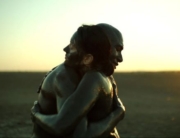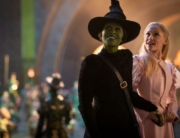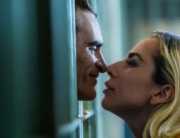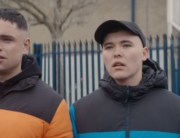CBGB is a warm gloss of nostalgia over the rise of the punk music scene in gritty 1970’s downtown New York. The spirit of musical and visual energy nearly outweighs its fanciful superficiality around Hilly Kristal, who gave a lot of groundbreaking bands a now legendary club to make a whole lotta noise that reverberated throughout rock ‘n’ roll.
The colorful travails of Hilly Kristal (a surprisingly dour Alan Rickman) to start up and run CBGB are narrated by the teenage John Holmstrom (Josh Zuckerman), first from the suburban Connecticut basement where he anoints a musically and politically rebellious movement within the pages of his Punk Magazine, and then as he strolls the streets of the Lower East Side with British music critic, and later filmmaker, Mary Harron (Ahna O’Reilly). Holmstrom’s real drawings—originals and new, exuberant graphic novel-like scene segues—enliven the exposition. A flashback to the restless infancy of the man born as Hillel on a poultry farm in southern New Jersey sets up a touch of whimsy and magic realism, and a brief glimpse of the leftist community of Jewish farmers.
A bankrupt failure in managing marriages and bars, Hilly searches the very grungy streets of New York for a broken-down venue he can just fix up enough without attracting the attention of inspectors that will showcase country, bluegrass, and blues musicians. (The production design incorporates actual ratty pieces from the club saved after it closed down in 2006 that seem to retain odors of all the liquid, excrement, and vermin messes seen on the screen.) He befriends and gains the cooperation of neighborhood cops, bikers (Sons of Anarchy fans will recognize Ryan Hurst in a similar leather jacket), and junkies (an unrecognizable Freddy Rodriguez’s Idaho is a representative type). His Anglophile buddy Merv Ferguson (Donal Logue) comes along as bartender and he finds mechanical whiz kid Taxi (Richard De Klerk) to run the sound board.
Really only interested in finding and socializing with new bands (once he drops country music, it’s not clear why he likes what), Hilly very reluctantly has to let his estranged family help him out—a crucial loan from his sassy and shrewd mother Bertha (Estelle Harris) and financial management by his daughter Lisa (Ashley Greene), who eventually works out a reconciliation with him as she stridently insists on progressing from waitressing. (Lisa Kristal Burgman has a producing credit and presumably influenced her portrayal.)
Like a jukebox musical, but without context of how punk woke up mainstream rock, the rest is an entertaining, rapid-fire montage of guess-who impersonations of famous musicians and bands who got their start at the club, or came later for its imprimatur for punk credibility—and at least one, Iggy Pop (Taylor Hawkins), who never performed there—along with music producers (Stana Katic as Genya Ravan), managers (a very bearded Johnny Galecki), and record company suits (Bradley Whitford). Despite wigs that look patently fake, instantly recognizable are the Ramones in black leather (anchored by Joel David Moore as Joey, though not sounding at all like he’s been “sitting here in Queens/eating refried beans”); Blondie’s Debbie Harry (Malin Akerman) purring about owning her sexuality; and young Patti Smith looking straight off the cover of her Horses album. (Mickey Sumner is the daughter of Sting, who is portrayed here by Keene McRae debuting “Roxanne” with the Police.)
The closest any of the musicians are seen as individuals—and the negative effects of all the booze and drugs being copiously imbibed all around—is through the short-lived band the Deadboys, whose self-destructive behavior is comically treated as not just a stage show—Justin Bartha seems certifiably crazy as lead singer Stiv Bators and Rupert Grint enthusiastically plays guitarist Cheetah Chrome, who has a cameo as a cab driver. Rodger Grossman’s What We Do Is Secret (2008) is a more serious look at what the total immersion into such a punk lifestyle did to the West Coat band the Germs.
In the closing footage, the Talking Heads pay tribute to Hilly at their induction into the Rock ‘n’ Roll Hall of Fame in 2002. The now familiar tracks are covered as if in a PBS fundraising special down the Bowery-as-memory lane. But overall this is an enjoyably jaunty walk down the not very wild side.






Nice review! So many people do not get it. You do!
Thanks!